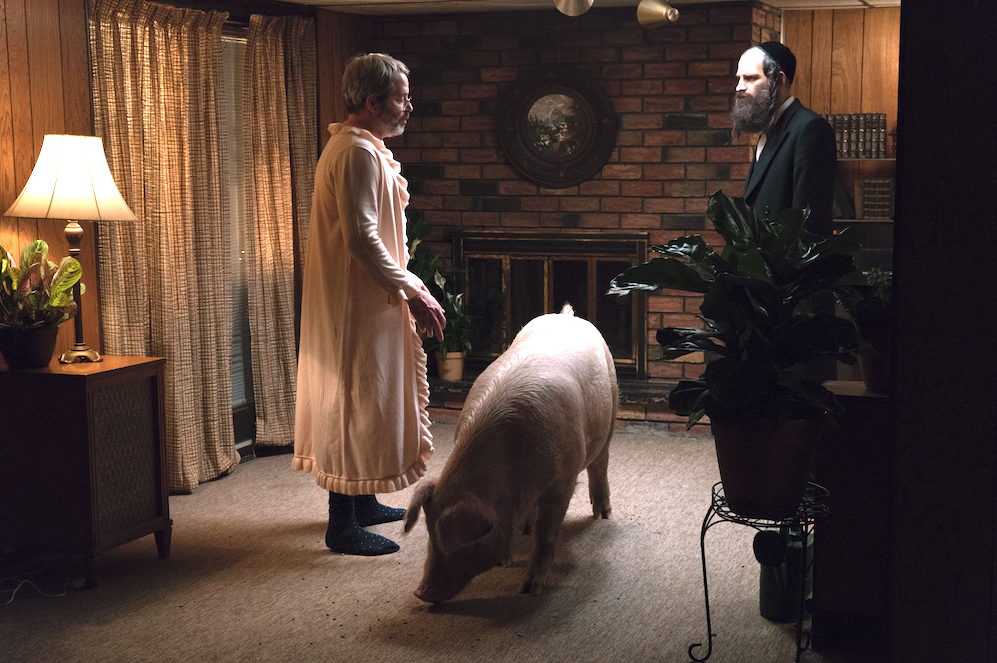Death and taxes
A conversation with To Dust director Shawn Snyder
From The Orlando Weekly, March 13, 2019
Benjamin Franklin famously said that the only certain things were death and taxes, and both were on the mind of Florida native Shawn Snyder when I spoke to him recently about his debut feature, To Dust.
Raised near Miami and now residing in New York City, Snyder has chosen as his first feature a refreshingly odd tale he concocted with fellow Floridian Jason Begue. The unlikeliest buddy dramedy of the year, To Dust is the story of a man grappling with his wife’s death.
Morbidly obsessed with the body’s decomposition and its relationship to the soul, Shmuel (Géza Röhrig, Son of Saul) reaches out to his rabbi. But unable to find answers, he turns to a snarky science teacher (Matthew Broderick), and together they embark on an absurd odyssey of intellectual and spiritual growth. It’s as if the Coen Brothers rewrote The Odd Couple, making Oscar even more irreverent and turning Felix into a Hasidic Jew.
“The heart and the emotional core of it all stems from my mom’s death about 10 years ago and sort of my experiences with grief afterwards,” Snyder says. “I come from a Reform Jewish background, which is certainly not Hasidic, and it waxes and wanes on my own kind of ongoing pilgrimage with Judaism and spiritual questions at large. Judaism has a timeline for grief, … and objectively I’ve always found it to be incredibly profound and poignant and life-affirming in the face of loss.”
But emotions don’t always run on a timeline, and both Snyder and his character struggled with traditional mourning.
“I found my grief to be spilling outside the boundaries of those confines, and the sense that any grief could be contained or defined felt very unfitting to me. And I started to realize that grief is specific – and as specific as the relationship between the person who has been lost and the person who is left behind. And then my own grief goes on 10 years later, and it’s something that evolves, and it’s something that grows, and it’s not something that I feel I need to exorcise or purge. I’m very appreciative of the way in which it grows, and it keeps my mom present and my relationship with her evolving. So the movie sort of emotionally comes from … the right to grieve in a wholly personal and idiosyncratic way.”
Though Snyder – who comes to filmmaking by way of a blues-folk music background – says he is content in New York City, he still embraces his Miami roots. Indeed, he says he would love to shoot a film in Florida if the financial terrain were friendly.
“The idea is [to set my next film] in South Florida, ‘cause I do think there are so many indigenous South Florida stories,” Snyder says. “I think that one of the first issues with tax incentives is that they are amazing, but … you get the big Hollywood production that comes into town, uses up the workforce but then moves back to Hollywood. [The production] ships in and exploits this place and exploits the workforce, [and] there isn’t necessarily this encouragement of local, South Florida storytelling or storytelling that’s specific to that place.
“I have these crazy, sort of activist ideas about how you can hack the tax incentives to give more … to a South Florida … filmmaker in that location, making stories about that location, instead of just using Atlanta [as] your generic urban environment for the next Marvel movie.”
Florida lawmakers seem somewhat more inclined recently to embrace filmmaking, but even if tax incentives never materialize, we can still take joy in the knowledge that homegrown moviemakers like Snyder are exercising their unique cinematic voices.
© 2019 Orlando Weekly / MeierMovies, LLC
For more information on the movie, visit IMDB.com.
